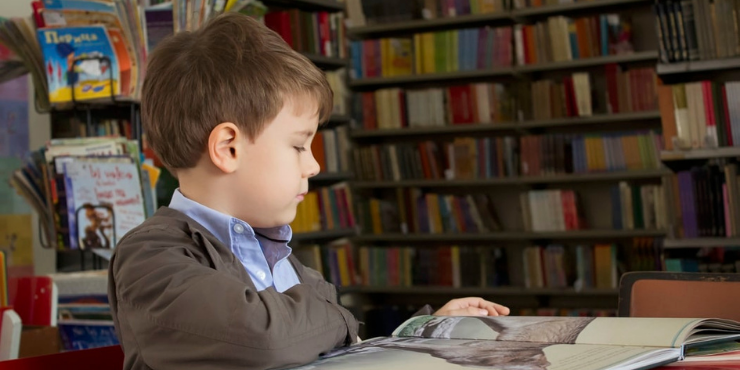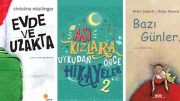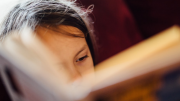ALİCAN ACANERLER
“I’m not surprised; hundreds of books, TV shows, and movies may have been banned before. When Canan finds out that the children’s book her father had bought her two years ago was censored for wording in it; she says “I’ve heard it for other things I watch on Netflix and on TV. It is disappointing that such a thing exists in the 21st century”. Canan is 12 years old and a seventh-grade student at a college in Istanbul.
Award-winning Italian writers Elena Favilli and Francesca Cavallo’s children’s book, Good Night Stories For Rebel Girls, in which they compiled the stories of women who could inspire everyone from all over the world in 2016, was declared ‘obscene publication’ by the decision of a board within the Ministry of Family, Labor and Social Services in Turkey. In other words, the ministry found the publication of the book objectionable. However, Canan said that she liked the book very much and that she even read it from beginning to end twice.
CHILDREN IN THE ‘100-DAY ACTION PLAN’
As of 2019, children constitute 27.5% of Turkey’s population. Turkey is the first country in Europe in the ratio of child population to the adult population. However, the sales figures of children’s books in a country with such a young population are underwhelming. According to the 2020 sales data of the Turkish Publishers Association, the market share of children’s books is only about 4 percent of all other publications, which is 9 percent less than the 2019 data.
President Recep Tayyip Erdoğan expresses his interest in children at every opportunity. In fact, in the 100-Day Action Plan that Erdogan announced after the 2018 general elections, there was an article to support child-friendly books and combat harmful content. Thereupon, the Ministry of Family, Labor and Social Services declared 427 books “child-friendly”. While announcing child-friendly books the Ministry’s statement was remarkable: “As of the end of 2019, 7 thousand 423 works were examined and nine of them were declared as obscene publications.”
DESIRED CENSORSHIP: PUBLICATIONS FOR CHILDREN
In recent years, some children’s books, in which the chapters are decontextualized and shared on social media, have almost turned into a subject of lynching. Children’s literature is frequently targeted by some media outlets, and after targeting, the Ministry of Family can take an “obscene publication” decision about these books in a short time.
For example, a book translated and published by the Scientific and Technological Research Council of Turkey (TÜBİTAK), an official research institution affiliated with the government, in the summer of 2020, was frequently shared on Twitter, by taking passages out of context. The reactions on social media have grown so much that the Ministry, which took action immediately, even declared a children’s book published by another official institution of the state as an obscene publication.
On the other hand, sometimes in the opposition media, We see the discussion on “should children’s books be banned?” taking place. A citizen journalism website named Dokuz8Haber claims that a children’s book that contains expressions that encourage pedophilia, sexual abuse and violence, can be pointed to as a target just like the pro-government media does.
PARENTS ARE GETTING DESPERATE
Families and teachers who buy books for children are very confused due to this censorship debate, which is desired by all segments of society. Documentary director Mustafa Ünlü, who reads Good Night Stories For Rebel Girls every night to his six-year-old daughter, said, “I have difficulty in understanding. However, every time I read the stories of the women in the book to my daughter, I thought I was helping her grow up with a character who does whatever she wants when she puts her mind to it.” Director Ünlü complains that in the face of cultural and political conservatism in Turkey, every content that the state will not like is tried to be blocked. Many parents, like Mustafa Ünlü, get desperate at the bombardment of arguments between both sides on the issue of censorship.
This is not the first time that this has happened to a children’s book. In fact, the history of the concept of an obscene publication in Turkey dates back to the first years of the Republic. “The Protection of Minors from Sexually Explicit Materials Act” enacted in 1927 commends that the criteria that the Ministry of National Education considers in the works the Ministry publishes should be included in all children’s books on the market. The first version of the law, which stipulates the immediate confiscation of the books containing obscenity, eroticism, sexuality and criminal elements (the ones listed in Articles 426, 427 and 428 of the Turkish Penal Code), underwent many changes in the following years. One of the most important reasons for this is that Turkey experienced three military coups in the half-century after the law came into force. Every time the armed forces seized power during the coup d’état, thousands of books were decided to be banned beyond censorship for showing reasons of national security and public order.
CENSOR TO CHILDREN’S BOOKS IN TURKEY FROM PAST TO PRESENT
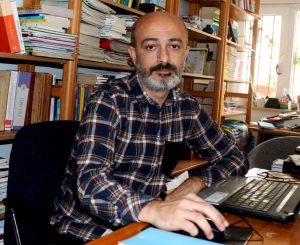
Safter Korkmaz
Safter Korkmaz, the Managing Editor of the magazine named İyi Kitap, also mentions that during the military coup in 1980, when he was a university student, “search for banned publications” was made frequently in the dormitory of the school. Safter Korkmaz states that the history of book bans in Turkey is parallel to the periods of oppressive governments.
In the Turgut Özal era, when the military abdicated from the government and Turkey was trying to democratize again, the law in 1927 took on a completely different structure and became similar to today’s control mechanism. Although it was subjected to an intense objection process by the Social Democratic Populist Party (SHP), which was the opposition party of the time, in 1986, in accordance with the “Protection of Minors From Sexually Explicit Materials Act” a committee with the same name is established within the Prime Ministry.
Korkmaz, while making a comparison between the past and the present of the obscene committee, said, “However, unlike today, the reaction from all segments of the society to the practices of the Board was much stronger and more effective at that time. The opposition, in and out of the parliament, manages to come together and raise their voices against the Committee and its practices, despite the September 12 practices still in effect. Rising reactions cause the government to take a step back over time, and the Committee retreats to a more passive position at the beginning of the 90s,” he explains the period.
This committee has the authority to evaluate children’s books that are available on the market after publication, upon request. It is not possible to reach a clear number of how many books the committe has decided on in total until 2021, which used to include a representative from the ministries, each with 15 years of public service experience, as well as a member from the Council of Higher Education, the Presidency of Religious Affairs and the General Directorate of Press and Information. However, the Publishers Association has been preparing “Reports on Liberty of Publication” annually since the 1990s. The term “obscene publication” is found in almost all of the association’s research from the first report till 2020.
“SOLIDARITY AND PUBLIC REACTION IS NEEDED”
One of the works mentioned in the reports of the association is Henry Miller’s Tropic of Capricorn, of which the publisher is Erdal Öz. Saying that the book was declared obscene and the translator was penalised, Korkmaz explains the solidarity that emerged after this as follows:
“In response to confiscation and criminal cases, 39 publishers republish Tropic of Capricorn together. Leaving blank the places that the committee found unconvenient, but adding the indictment and Erdal Öz’s defense at the end of the book… Thus, the reader can follow the places left blank from the indictment, as well as access Erdal Öz’s defense against censorship.
This time, 39 publishers are filed, but since publishing the indictment does not constitute a crime, it results in acquittal. After this solidarity and public reaction, the court soon had to lift the confiscation order on the first edition of the book. This is a very important and valuable example of solidarity. It is the kind of solidarity that I hope will increase by expanding (in new forms) today as well…”
“NONE OF THE COMMITTEE MEMBERS ARE EXPERTS”
When Turkey transited into the presidential administration system in 2018 and with the abolition of the office of Prime Minister; the Committee for the Protection of Minors from Sexually Explicit Materials Act was included in the Ministry of Family, Labor and Social Services. The management structure of the Committe also changed. Any information on who sits on the committee is no longer accessible from publicly available sources. Except for the information that five experts have been appointed to the committee by the ministry, the functioning of the institution is not transparent and there is no legal regulation regarding the criteria it will consider in the evaluation procedure. The vague wording in the law, which was radically changed for the last time in 1986, hinders the formation of a healthy perception of the board.
It is possible to access information about the committee only after every decision taken by the committee is published in the Official Gazette. As a result of the evaluation made for each work, it is noticed that in all of these decisions, where the grounds is explained, a different practice is applied to the censorship of the books. In fact, the decision to sell some books in “black plastic bags” is frequently criticized in the media.
The Minister of Family Zehra Zümrüt Selçuk, at a press conference held in the past months, said that the situation in question was not censorship, and that the reason for the advises of the suggestion was only to raise awareness by “giving advice” to families. However, Mustafa Ünlü, who reads the censored book to his daughter every day, answers the question whether the ministry’s warning to families worked or not, “When I read the book, there was no section that I found strange and wrong”.
Safter Korkmaz also mentions that the statement of the Minister of Family does not fully reflect the truth. He underlines that the decisions taken by the committe of obscene are considered as grounds for investigation by the prosecutor’s office, and that in most cases criminal cases follow the committee’s decisions, such a situation corresponds to much more than advice; in short, he underlines that the process of the work not reaching the reader and punishing the publishers (author, translator and publisher officials) is already a de facto censorship. Korkmaz explains that the process leading to the decision of the committee, criminal case and confiscation also serves as intimidation to other publishers.
At this very point, Korkmaz says, “The power of political force, which makes itself felt in all areas of social life, can create reservations in some publishers (not only in publishers but also at back of house). For this reason the solidarity I spoke about in the 80s is exactly at the forefront of what we need today,” he adds.
THE BOOKS THAT HAVE BEEN ANNOUNCED OBSCENE CANNOT BE ACCESSED ON SOME SALE SITES
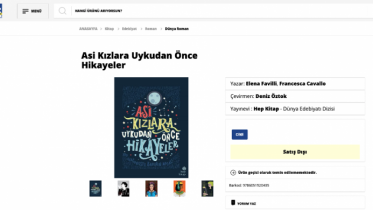
On the website, there are statements about the book “out of sale” and “the product is temporarily unavailable”.
When the decision taken by the Ministry about a book is reflected in the press and social media, even while the decision to stop the publication of that book has not been decided yet, publishing houses sometimes avoid reactions and do not make new editions of the books. For example, Hep Kitap, the publisher of Good Night Stories For Rebel Girls, abstain from answering when asked if they are going to reprint the work. While the book can still be ordered via Amazon, it is noteworthy that the same book cannot be purchased from online book-buying sites owned by holdings close to the government such as idefix and D&R. It seems that the publication date of a book purchased from Amazon is November 2020. In other words, it seems that the publishing house somehow continued to print after the decision of the ministry.
While other publishing houses like Hep Kitap hesitate to make a statement because the issue has been reflected in the press many times; a lawyer filed a stand-alone lawsuit last year to fight the Ministry’s censorship of children’s books. Ümit Erdem, the lawyer who filed the lawsuit, has a seven-year-old daughter. Erdem became a party to the lawsuit as the “girl’s father”. The lawsuit, which has been going on since 2019, is not only about the book called Good Night Stories For Rebel Girls. Ümit Erdem had included two different books in the case, which the Protection Committee had decided on when declaring Good Night Stories For Rebel Girls as an obscene publication in September 2019.
Being a girl and a boy in the society is criticized in a humorous way as articled in the books called the Declaration of the Rights of the Girls and the Declaration of the Rights of the Boys, written by Elisabeth Brami and illustrated by Estelle Bignon Spagnol. In the Declaration of the Rights of the Girls, Articles such as “She has the right not to be declared a ‘tomboy’ when she gets angry and shouts;” “She has the right to wear pants” refer to the achievements of women in the last two centuries as a result of changing perceptions in societies. Similarly, in the Declaration of the Rights of the Boys, cultural and social norms are being ridiculed by statements that “He has the right to behave coquettishly”; “he has the right to sew and knit”.
In another news prepared by the Speak Up Platform on the subject, Ümit Erdem explained that three separate expert reports were prepared about the books during the trial. The statements in the reports prepared by experts and evaluating whether the issues included in the Ministry’s decision are included in the books actually reveal the reason why the Protection Committe censors the books.
Throughout the expert reports, it is tried to explain that the sentences listed as the rights of girls and boys in the articles in the book are issues that have become normal all over the world over time and that the illustrations in the book will not disturb the psychology of children. There is another remarkable point in the report prepared for Good Night Stories For Rebel Girls.
In the second part of this article, starting from right this point we will discuss the effects of issues such as “social gender” and “gender identity”, which are put forward as excuses for censorship.

